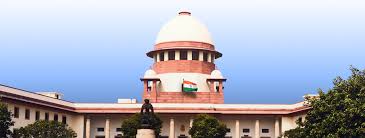By Matters India Reporter
New Delhi, Nov 8, 2024: The Supreme Court has ruled that the salaries given to Catholic priests and nuns teaching in aided schools come under the income tax rules.
Dismissing the appeals filed by 93 dioceses and congregations from Tamil Nadu and Kerala, a three-judge bench on November 7 said the vow of poverty taken by nuns and priests does not exempt them from paying taxes if their salaries come from government grants.
Senior advocates Arvind Datar and S Muralidhar, who appeared for the petitioners, said incomes of nuns and priests go to the congregation that runs the school and that these teachers personally do not acquire their salaries.
The petitioners explained that the nuns and priests have taken a vow of poverty and hence, the salaries earned by them by working as teachers in aided institutions are handed over to the diocese or convents. Therefore, the salaries are not accrued to them personally.
The counsel said the priests and nuns were protected by circulars issued from the 1940s and the department-initiated proceedings after someone wrote a letter to them in 2015.
The lawyer also submitted a few decisions of the Kerala High Court that have held that the family of a priest or nun, on his/her death, cannot claim compensation under the Motor Vehicles Act.
The petitioners explained that the salaries of nuns and priests get transferred to the congregation or diocese running the school, and the congregation submits returns wherever necessary.
The chief justice then pointed out that the nuns and priests receive the salaries in their personal account.
“Salary is received, but because of the vow of poverty, they say I will not retain the salary because in the diocese/parish, they cannot have personal income…But how does it affect the taxability of the salary? TDS has to be deducted.”
The chief justice stressed the need for a uniform application of law – that any person employed and receiving a salary would be subject to taxation.
“If there is a Hindu priest who says I will not retain this salary, and give the money for doing puja to an organization. But if the person is employed, he gets the salary, tax has to be deducted. The law is common for everyone. How can you say that it is not subject to TDS?”
“When the organization pays a salary, and it is treated as salary in the books of accounts of the organization, but that is not retained by the person and paid somewhere else, the application of money, either to the diocese or someone else, has nothing to do with taxability,” the chief justice said.
“This is salary in its true sense,” Justice JB Pardiwala said.
One of the petitioners said a person has to undergo rigorous training to become a nun or priest. At the final stage the person must take three sacred vows — of obedience, chastity and poverty.
Once the person becomes a member of a congregation, she or he cannot own any property and cannot have any income of her own.
“These sisters dedicate themselves as servants of God and spend their lives for charitable purposes and services like, education, health, rehabilitation of the poor, orphans and destitutes,” the petitioners’ lawyer said.
The petitioners challenged a Madurai bench of Madras High Court ruling that had rejected the petitioners’ plea for exemption from income tax, a relief enjoyed by aided missionary schools since 1944 until the federal government led by the Bharatiya Janata Party decided to impose tax deduction at source in December 2014.
The division bench heard the Income Tax Department’s appeals against a single bench judge’s decision that had allowed the writ petitions filed by Catholic religious institutions challenging steps taken for recovering tax on salaries paid to priests and nuns employed in aided educational institutions.
The single bench had accepted the case of religious institutions that since priests and nuns have taken a vow of poverty as per which they have to surrender their personal income to the Church/Diocese, no income is effectively accrued to them so as to make it liable for taxation. It further held that priests/nuns have suffered civil death as per Canon Law and renounced the world and therefore cannot be subjected to TDS.
The division bench of Justices Vineet Kothari and C V Karthikeyan held that the salaries were received by them in their individual capacity and that the subsequent surrender of their salaries to the religious institutions can only be treated as an application of income. The court further held that religious institutions cannot claim to have an overriding title with respect to the salaries at the source itself.











I welcome the judgement by the Supreme Court. Gone are the days when priests and nuns lived a simple lifestyle and practiced poverty.
The Income Tax law specifically mandates deduction of tax at source by the employer of the concerned employee/service provider, under the pain of being liable to penalty & prosecution as follows:
Late Filing Fee: A late filing fee of ₹200 per day is charged for the delay in filing the TDS return until the fee equals the TDS amount. Penalty: As per Section 271H, a penalty ranging from ₹10,000 to ₹1,00,000 may be imposed for the non-filing or incorrect filing of TDS returns. The law doesn’t differentiate between the Aam Aadmi and Priests & Nuns. Nowadays in all accounting packages TDS is inbuilt. It means tax at applicable rates is automatically deducted from the recipient’s income when remittance is made to his/her account. (Source: https://tax2win.in/guide/consequences-of-non-deduction-of-tds
“One of the petitioners said a person has to undergo rigorous training to become a nun or priest. At the final stage the person must take three sacred vows — of obedience, chastity and poverty”.
After getting such “rigorous training” why don’t they live like priests and nuns spending their time in prayer and penance? Why should they become school managers, headmasters, and principals?
To becomes a govt school teacher, candidates have to pass tests and interview conducted by the State PSC. Appointment is based on merit. But teachers in aided schools are appointed by the school management/church (salary and pension paid by govt). Such appointments are not done on merit, but by paying money/bribe to the management. The average bribe for an aided school teacher vary from Rs 20 lacs to Rs 50 lacs. Now the church deems it more lucrative to appoint nuns and priests as teachers than selling the vacancies.
After taking the vow of poverty, these priests and nuns draw salary from the government but refuse to pay tax. If this is how they practice poverty, one can imagine how they practice the other two vows, viz. obedience and chastity.
Income is Income, regardless of what you subsequently do with that money. Also the so-called vow of poverty has become a joke.
Chhotebhai has hit the nail on the head. Not all congregations take the vow of poverty. Isn’t it all too evident in the swanky cars/SUVs, iPhones, latest gadgets, addiction for alcohol and flesh, and of course siphoning of assets & funds in various congregations? Former bishop Franco Mulakkal is a classic case himself! In one parish in Central Kolkata (one of the largest in Bengal) charges have been levelled against the current parish priest for financial corruption, construction of personal property, ownership of expensive vehicles and evaporation of FD of Rupees One Crore left behind by the previous parish priest. The Archbishop of Calcutta has in October 2024 instituted an enquiry committee comprising two priests and an Audit firm named Periwal & Co! The parishioners have written back to the Archbishop that none of the parishioners (those who signed the petition to the Archbishop) have been kept on the Enquiry Committee. This is a very justified contention.
So why should priests and nuns have qualms about TDS being deducted from their salaries? To be fair to them, those who are earning substantial income for their respective congregation, can demand that because they are paying income tax, they be allowed to retain a certain portion of the money they earn. This will make things much more transparent.